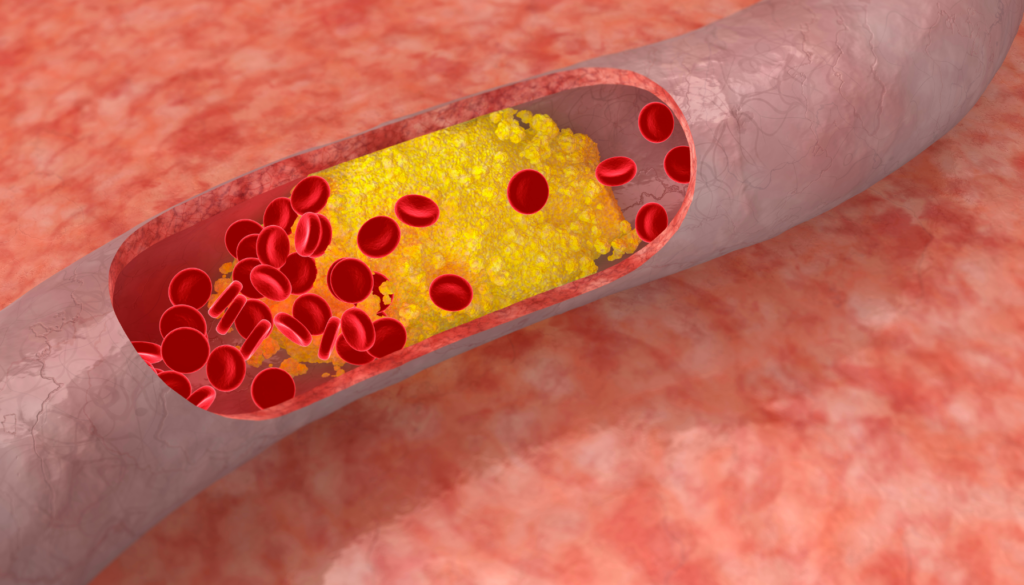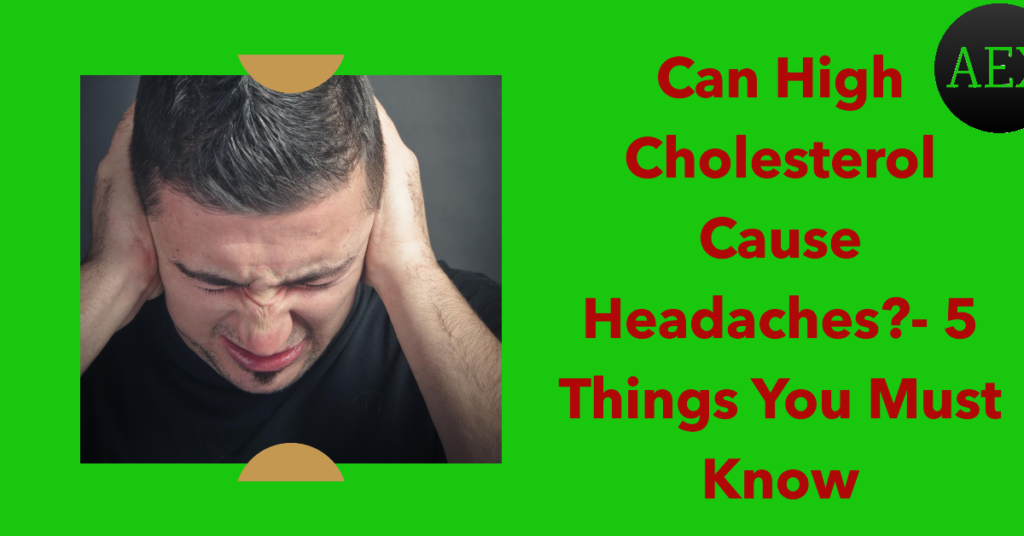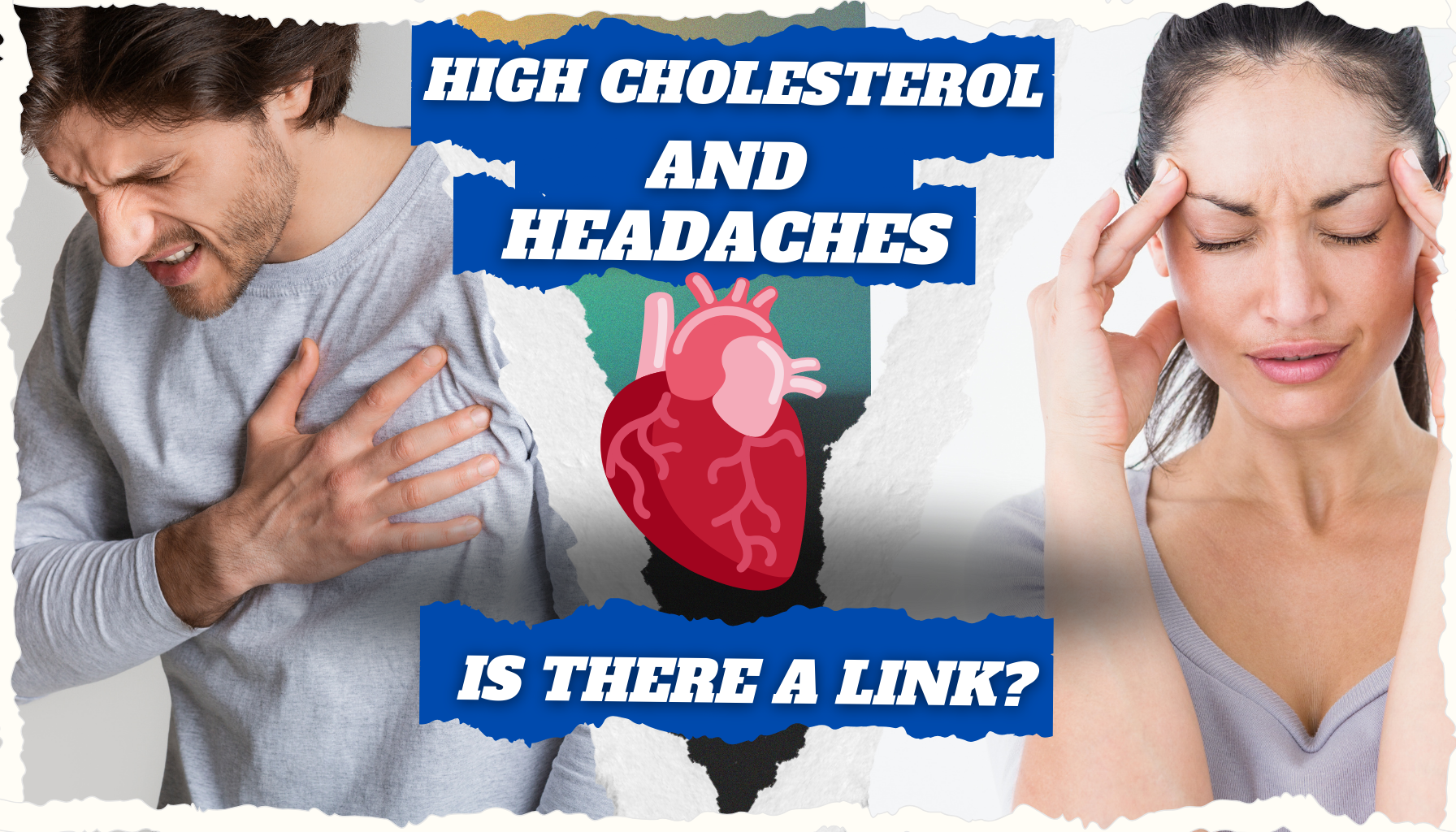High cholesterol and headaches might seem unrelated, but research is finding a possible link. This article will explore how high cholesterol could lead to headaches. We’ll look at the reasons, risk factors, and ways to treat it.
Keeping cholesterol levels healthy is key for heart health. High LDL cholesterol can cause artery blockages, raising heart disease and stroke risks. But cholesterol’s effects aren’t just on the heart. Some studies suggest it might also cause certain headaches.
High Cholesterol and Headaches: Is There a Link?
Explore the possible connection between high cholesterol and recurring headaches. Learn how cholesterol levels might indirectly contribute to headaches and what steps you can take to manage both effectively.
Key Takeaways
- High cholesterol and headaches may be linked, with emerging research suggesting a potential connection.
- Understanding the role of cholesterol in the body and the common symptoms of headaches is crucial.
- Risk factors and underlying mechanisms that may contribute to cholesterol-related headaches will be explored.
- Lifestyle factors, such as diet, exercise, and stress management, can impact both cholesterol levels and headache occurrences.
- Diagnosing and managing high cholesterol and headaches may require a comprehensive approach, including medical interventions and lifestyle modifications.
Understanding Cholesterol and Its Role
Cholesterol is a vital substance in our bodies. It plays a key role in many important processes. It’s a type of lipid, a fatty substance, that helps build cell membranes and hormones. Knowing about cholesterol is key to staying healthy.
What is Cholesterol?
Cholesterol is a waxy, fat-like substance. It’s made by the liver and found in our food. It helps make hormones, vitamin D, and bile, which aids in fat digestion.
Types of Cholesterol: LDL and HDL
There are two main types of cholesterol: LDL and HDL. LDL, or “bad” cholesterol, can lead to artery buildup and heart issues. HDL, or “good” cholesterol, helps remove excess cholesterol, reducing heart disease risk.
| Cholesterol Type | Function | Ideal Levels |
|---|---|---|
| LDL (Low-Density Lipoprotein) | Transports cholesterol to cells, can contribute to plaque buildup in arteries | Less than 100 mg/dL |
| HDL (High-Density Lipoprotein) | Transports cholesterol away from cells, helps remove excess cholesterol from the body | Greater than 60 mg/dL |
Keeping LDL and HDL cholesterol in balance is crucial for heart health. This balance is affected by diet, exercise, and lifestyle.
Headaches: A Common Ailment

Headaches are a common health problem that affects people of all ages. They can range from mild to severe migraines, greatly affecting one’s life. It’s important to know the different types of headaches, their symptoms, and what might trigger them.
Tension headaches are the most common. They feel like a dull ache that starts in the neck or skull. They can be caused by stress, bad posture, or tight muscles. Migraines are more severe, causing throbbing pain and sensitivity to light, sound, and smells. Cluster headaches are rare but very painful, focusing on one eye or temple.
Headaches can be caused by many things, like dehydration, lack of sleep, or hormonal changes. Knowing and dealing with these causes is key to managing and preventing headaches.
Headaches can be a big problem, but they often point to a bigger issue in the body. By understanding the different headaches and their causes, people can take steps to feel better. Making lifestyle changes, managing stress, and sometimes getting medical help can help find lasting relief.
Can High Cholesterol Cause Headaches?
Researchers and healthcare experts are looking into if high cholesterol can cause headaches. They’re not sure how, but they think there might be a link. High cholesterol could be connected to some headaches.
The Potential Link
High cholesterol levels can harm your heart and blood vessels. When cholesterol builds up in arteries, it forms plaque. This makes arteries narrow and hard, affecting blood flow and oxygen to the brain.
This reduced blood flow might start headaches, especially migraines. Changes in blood vessel size and pressure can lead to headache symptoms.
Risk Factors and Underlying Mechanisms
- Elevated lipid metabolism and cholesterol levels in the body
- Inflammation and endothelial dysfunction within the blood vessels
- Impaired cardiovascular health and blood flow to the brain
- Genetic predisposition and lifestyle factors, such as diet and physical activity
The connection between high cholesterol and headaches is complex. Some studies suggest a link, but more research is needed. We need to understand how they’re related better.
People with high cholesterol or heart problems might get headaches more often. It’s key to work with your doctor to keep your cholesterol levels in check. This helps your cardiovascular health and can reduce headache symptoms.
Signs and Symptoms of Cholesterol-Related Headaches
It’s important to know the signs of headaches linked to high cholesterol. Headaches can have many causes. But, some symptoms might point to cholesterol problems.
Distinguishing Features
People with cholesterol-related headaches often notice:
- Throbbing or pulsating pain in the temples or the back of the head
- Persistent, dull ache that may worsen with physical activity
- Sensitivity to light and sound, which can make the pain worse
- Nausea or vomiting when you have a headache
- Dizziness or lightheadedness during a headache
These signs, along with high cholesterol levels, might mean there’s a link. Knowing these signs can help you see if you need to see a doctor.

Learn about the relationship between high cholesterol and headaches. Understand the factors that may tie these two conditions together and explore ways to manage your health for lasting relief.
“Recognizing the unique characteristics of cholesterol-related headaches is the first step in addressing this potential health concern.”
Lifestyle Factors Affecting Cholesterol and Headaches
Keeping a healthy lifestyle is key for managing high cholesterol and headaches. Diet and exercise, along with stress management, play big roles.
Diet and Exercise
Eating a balanced diet is vital for controlling cholesterol levels and easing headaches. Focus on whole foods like fruits, veggies, whole grains, and lean meats. These can help lower bad cholesterol and boost good cholesterol.
Regular exercise, like brisk walking or swimming, is also important. It improves heart health and can help manage headache symptoms by reducing stress.
Stress Management
Stress affects both cholesterol levels and headache symptoms. It can raise bad cholesterol and lower good cholesterol, increasing heart disease risk. Stress can also trigger headaches like tension-type and migraines.
Using stress-reducing methods, like meditation or yoga, can help. These practices can manage stress and improve both cholesterol and headache issues.
By tweaking your diet, exercise, and stress management, you can improve your health. A balanced approach that cares for both body and mind is essential for optimal health.
Medical Conditions Associated with High Cholesterol and Headaches
High cholesterol levels can be linked to headaches through various medical conditions. Elevated cholesterol can lead to health issues. These issues might also cause headaches.
High cholesterol affects the heart and blood vessels. Heart disease and stroke are common problems. They can cause headaches because of reduced blood flow.
Neurological disorders like migraines and tension-type headaches are also linked to high cholesterol. The exact reason is still being studied. But, inflammation and blood vessel problems might play a part.
| Medical Condition | Potential Link to High Cholesterol and Headaches |
|---|---|
| Heart Disease | Plaque buildup in arteries can restrict blood flow and contribute to headache symptoms. |
| Stroke | Disruption of blood flow to the brain due to high cholesterol can lead to headaches. |
| Migraines | Inflammation and vascular dysfunction associated with high cholesterol may trigger migraine episodes. |
| Tension-Type Headaches | High cholesterol and related vascular changes may contribute to the development of tension-type headaches. |
People with high cholesterol should know about these health links. They can talk to their doctors about managing cholesterol. This helps address headaches and other health issues.
Diagnosing Cholesterol-Related Headaches
Finding out if high cholesterol levels cause headache symptoms needs a detailed check-up. It’s key to find the real cause. This helps in treating and managing the link between cardiovascular health and headaches.
Blood Tests
The first step is a blood test. It checks your cholesterol levels. It looks at LDL and HDL cholesterol and triglycerides too. These all play a part in heart health.
Imaging Studies
Healthcare might suggest more tests to see if high cholesterol levels cause headache symptoms. These could be:
- Magnetic Resonance Imaging (MRI) to check for brain problems
- Carotid Doppler ultrasound to see how the carotid arteries are doing
- Computed Tomography (CT) scans to find blood vessel blockages
By looking at blood tests and imaging studies together, doctors get a full picture. They understand how cholesterol levels might affect headache symptoms. This helps in making a good treatment plan.
Managing High Cholesterol and Headaches
High cholesterol and headaches need a mix of treatments. This includes medicines and changes in lifestyle. These steps help manage health and improve overall well-being.
Medications
Doctors might suggest statins for high cholesterol. These drugs lower “bad” cholesterol. This can help prevent heart disease.
For headaches linked to high cholesterol, doctors might prescribe pain relievers. Over-the-counter NSAIDs can help. For severe headaches, stronger medicines might be needed.
Lifestyle Modifications
Healthy choices are key in managing cholesterol and headaches. Eating heart-healthy foods can help. So can regular exercise and stress management.
- Regular exercise improves heart health and stress levels.
- Stress management, like meditation, can help.
- Keeping a healthy weight is important for cholesterol and headache prevention.
Combining medicines with lifestyle changes helps manage health. This approach improves overall well-being.

| Medication | Purpose | Potential Side Effects |
|---|---|---|
| Statins | Lowering LDL cholesterol levels | Muscle pain, liver damage, increased risk of diabetes |
| NSAIDs (e.g., ibuprofen) | Reducing headache symptoms | Stomach irritation, increased blood pressure, kidney problems |
| Triptans (e.g., sumatriptan) | Relieving severe or persistent headaches | Chest pain, dizziness, fatigue |
It’s crucial to work with a doctor. They can help find the right medicine and watch for side effects.
Prevention Strategies for High Cholesterol and Headaches
Keeping your cholesterol levels healthy is key for your heart and can help with headaches. By using prevention strategies, you can improve your health and lower the risk of heart problems.
Regular Checkups and Monitoring
Seeing your doctor regularly is important for checking your cholesterol. They can do blood tests to see your LDL (bad) and HDL (good) cholesterol levels. Catching high cholesterol early can help prevent headaches and heart issues.
Adopting a Heart-Healthy Diet
Eating a diet full of fruits, veggies, whole grains, and lean proteins is good for your cholesterol. Avoiding saturated and trans fats, and refined carbs, can also help your heart and might ease headaches.
Engaging in Regular Exercise
Exercise is great for managing cholesterol and overall health. Doing a mix of cardio and strength training can lower bad cholesterol and raise good cholesterol. This might also help lessen headache frequency and severity.
Stress Management Strategies
Stress can hurt your cholesterol and headaches. Using stress-reducing activities like mindfulness, yoga, or relaxation can help. These can improve your heart health and reduce headaches.
By following these prevention steps, you can keep your cholesterol healthy and lower headache risks. A mix of regular doctor visits, a healthy diet, exercise, and stress management is key for better health.
Conclusion
The connection between high cholesterol and headaches is complex and interesting. Research shows that high cholesterol might lead to some headaches. To keep cholesterol levels healthy, eat well, exercise, and manage stress.
Regular health checks and monitoring cholesterol are key. If headaches don’t go away, see a doctor right away. Working with doctors can help manage both high cholesterol and headaches.
High cholesterol and headaches show how our body’s systems are connected. Taking care of our heart health can help prevent heart disease and some headaches. By managing these conditions, we can live a better life.
High Cholesterol and Headaches: Uncovering the Connection
Can high cholesterol be the cause of your headaches? Discover the potential link between cholesterol levels and head pain, and find out how to reduce your risk through lifestyle changes.
FAQ
Can high cholesterol cause headaches?
High cholesterol might be linked to headaches, but we don’t know all the details. High cholesterol can lead to heart problems. These problems might cause headaches.
What are the common symptoms of cholesterol-related headaches?
Cholesterol headaches often feel like a dull ache in the head. You might also feel more sensitive to light or sound. Other symptoms include dizziness, nausea, or feeling tight in the neck or temples.
How are cholesterol-related headaches diagnosed?
Doctors use blood tests and imaging like MRI or CT scans to diagnose these headaches. They look at your medical history and symptoms. This helps them see if high cholesterol is causing your headaches.
What lifestyle factors can impact both cholesterol and headaches?
Your diet, exercise, and stress levels affect both cholesterol and headaches. Eating well, staying active, and managing stress can help. These habits can keep your cholesterol in check and reduce headache frequency.
What medical conditions are associated with high cholesterol and headaches?
Heart disease, stroke, and some brain disorders are linked to high cholesterol and headaches. People with these conditions might get headaches more often due to their cholesterol levels.
How can high cholesterol and headaches be managed?
Managing high cholesterol and headaches involves medicine and lifestyle changes. This includes a healthy diet, exercise, and stress management. A doctor will create a plan to help with both cholesterol and headaches, improving your overall health.
What are some prevention strategies for high cholesterol and headaches?
To prevent high cholesterol and headaches, get regular check-ups and eat well. Stay active and manage stress. These steps can help lower your risk of high cholesterol and headaches.

